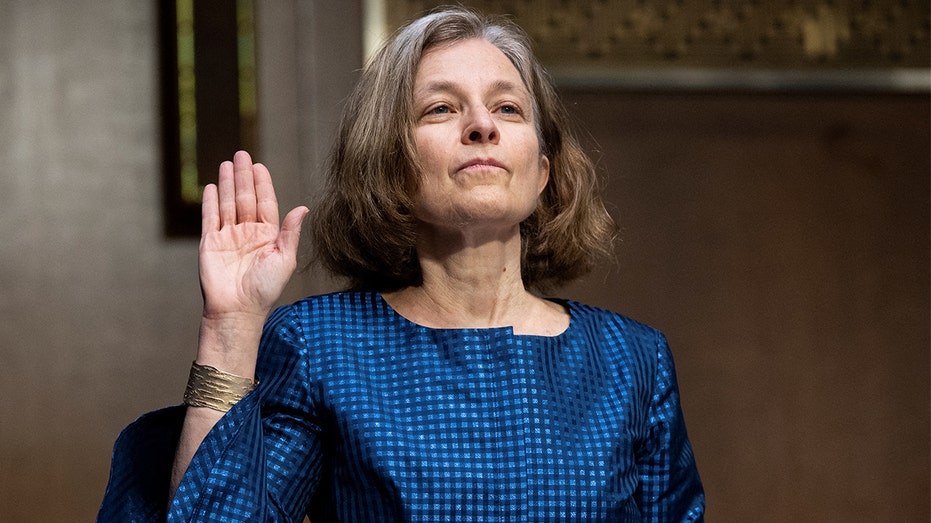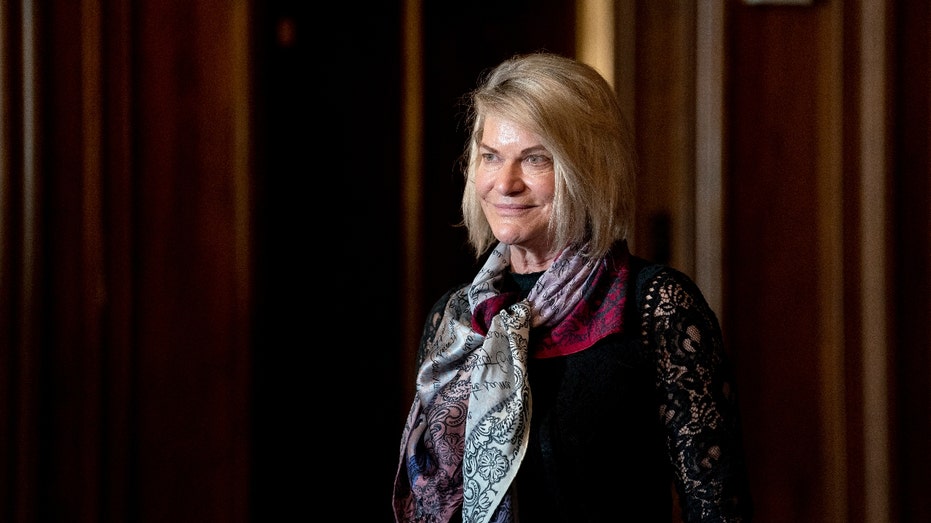Rep. Jamie Raskin failed to report huge stock payout for his wife, a Biden Fed nominee
Sarah Bloom Raskin sold $1.5M in stock in 2020
Sen. Haggerty rips Bloom Raskin's policies: 'Should not allow nominees to weaponize the Fed'
Sen. Bill Haggerty, R-Tenn., discusses Biden's Fed nominee Sarah Bloom Raskin, Biden's policies falling short of Americans' approval and the U.S. sending 3,000 troops to NATO countries.
Democratic Rep. Jamie Raskin violated a federal conflict-of-interest law by failing to properly disclose stock shares that his wife – President Biden's nominee to be the Federal Reserve's top banking regulator – received for her work at a Colorado-based financial technology company, a source familiar with the matter told FOX Business.
The Maryland Democrat disclosed information about the transaction in August 2021 – eight months after Sarah Bloom Raskin sold 195,936 shares of Reserve Trust for $1.5 million, according to a federal financial disclosure. The document listed the initial transaction date as Dec. 18, 2020.
Business Insider first reported the news.
SARAH BLOOM RASKIN OPPOSED BY 24 STATE FINANCIAL OFFICERS OVER 'RADICAL' VIEWS
Lawmakers' spouses are allowed to trade in companies or industries that their partners may help regulate. But Jamie Raskin's failure to promptly disclose the shares that his wife sold marks a violation of the Stop Trading on Congressional Knowledge Act. The law – frequently referred to as the STOCK Act – was passed in 2012 in an attempt to increase transparency on Capitol Hill; the law made it illegal for members of Congress and their families to profit from inside information and requires lawmakers to report stock trades to Congress within 45 days.
Jamie Raskin, a prominent lawmaker who led the second impeachment trial of former President Trump, did not immediately respond to a FOX Business request for comment. But the Democrat has acknowledged the late filing and told Business Insider that the omission occurred because the transaction happened just before their 25-year-old son, Thomas, died on Dec. 31, 2020.

Sarah Bloom Raskin, nominated to be vice chairman for supervision and a member of the Federal Reserve Board of Governors, is sworn in before a Senate Banking, Housing and Urban Affairs Committee confirmation hearing on Capitol Hill in Washington, Feb (Bill Clark/Pool via Reuters / Reuters Photos)
"We lost our son during the reporting period, and I filed the report late," the congressman told Insider.
The oversight also comes at a pivotal moment for Sarah Bloom Raskin, who was formally nominated last month by Biden to serve as the Federal Reserve's vice chairwoman for supervision.
As vice chair for supervision, Sarah Bloom Raskin – a Duke University law professor who has held high-level jobs at both the Treasury Department and the Fed – would oversee annual stress tests that review bank safety and liquidity. Her nomination has been welcomed by progressive senators and advocacy groups, who think she will take a tougher stance against Wall Street than her predecessor, Randal Quarles, a Trump nominee who stepped down last month.
But she has faced fierce pushback from Republican lawmakers concerned that her stance on issues like climate change could endanger the central bank's independence.
The Fed nominee has previously argued that all financial institutions should re-evaluate their relationships with energy companies and has advocated for a push toward sustainable investments that do not depend on carbon and fossil fuels. If banks and other financial institutions do not take these steps to distance themselves from fossil-fuel companies, Sarah Bloom Raskin has said the Fed should penalize them.
Sarah Bloom Raskin has also drawn scrutiny for her work at Reserve Trust: The nonbank fintech company is the only one of its like to have received special access to the Fed's payment system – an occurrence that happened when Sarah Bloom Raskin served as the company's director.
Access to Federal Reserve services is sought after by many fintechs and other nontraditional financial services companies, because there are a number of benefits, including the ability to borrow from the Fed's discount window and to earn interest from deposits at the central bank. Without a master account, nonbank financial institutions must partner with banks insured by the Federal Deposit Insurance Corp. in order to tap those services.

Sen.-elect Cynthia Lummis, R-Wyo., meets with the media on Nov. 9, 2020, in Washington, D.C. (Stefani Reynolds-Pool/Getty Images / Getty Images)
Sen. Cynthia Lummis, R-Wyo., probed Sarah Bloom Raskin over her connections to Reserve Trust, noting that many other nonbank financial institutions have applied and failed to receive a Fed master account. (The company even touts its access on the front of its homepage: "Move beyond the bank. Reserve Trust is the first fintech trust company with a Federal Reserve master account.")
Sarah Bloom Raskin served on the Fed's board from 2010 to 2014 and was tapped by former President Obama to serve as assistant Treasury secretary. She joined the Reserve Trust board in May 2017, four months after she left the Treasury Department.
CLICK HERE TO READ MORE ON FOX BUSINESS
Reserve Trust had its master account application in June 2017; one year later, the application was approved.
Lummis questioned whether Sarah Bloom Raskin called the Federal Reserve to expedite Reserve Trust's application and said the nominee had called the Kansas City Federal Reserve in 2017 asking about master accounts.
"Something doesn't smell right with the way this played out," Lummis said.
Sarah Bloom Raskin denied any wrongdoing.
"If you are suggesting anything improper, I want to make very clear: I have had the honor to serve in various public capacities, and each time I have left, I have been very mindful of rules regarding departure," she said.
FOX Business' Hillary Vaughn contributed to this report





















